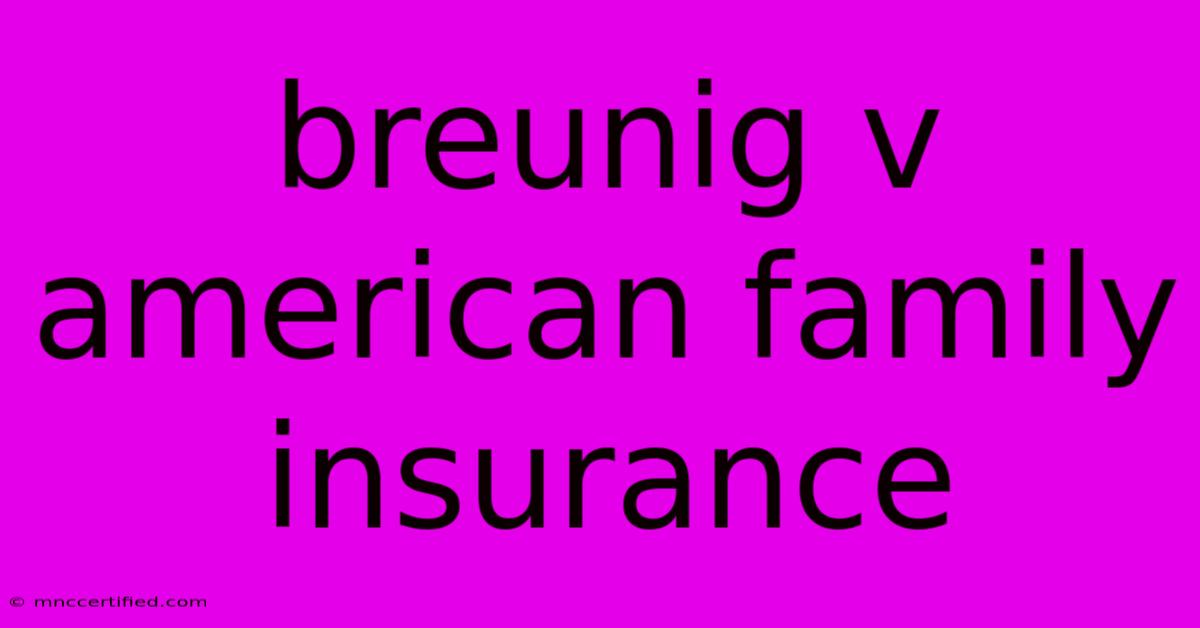Breunig V American Family Insurance

Table of Contents
Breunig v. American Family Insurance: A Landmark Case on Coverage Disputes
The landmark case of Breunig v. American Family Insurance (2000) stands as a pivotal moment in the realm of insurance coverage disputes. This case, originating in Wisconsin, explored the crucial question of whether an insurance company could deny coverage based on their subjective interpretation of policy language.
The Case: A Collision of Interpretations
The case centered around a dispute involving a car accident. Gary Breunig, the insured, was involved in a collision with Brenda Smith, who was driving a car owned by William Smith.
Breunig's insurance policy with American Family contained a clause that excluded coverage for "any vehicle furnished for the regular use of the named insured or a resident of the named insured's household." American Family argued that this exclusion applied because William Smith, who lived with Brenda Smith, had regular use of the car.
Breunig, however, argued that the policy's language was ambiguous and could be interpreted to exclude only vehicles used exclusively by a named insured or a resident of their household. He further argued that the policy language did not specifically address shared use of vehicles.
The Court's Decision: A Victory for Policyholders
The Wisconsin Supreme Court ruled in favor of Breunig. The court recognized the ambiguity of the policy language and held that it was not clear whether the exclusion applied to vehicles used regularly but not exclusively by a resident of the named insured's household.
The court emphasized the importance of interpreting insurance policies in favor of the insured when ambiguity exists. This principle, known as the doctrine of contra proferentem, is a cornerstone of contract interpretation.
Key Takeaways:
- Ambiguity Favors the Insured: This case highlights the principle that when ambiguity exists in policy language, courts will interpret the policy in favor of the insured.
- Subjective Interpretation Not Permitted: Insurance companies cannot deny coverage based on their own subjective interpretation of policy language, especially when it is ambiguous.
- Importance of Clear Policy Language: The case underscores the importance of insurance companies using clear and unambiguous language in their policies to avoid future disputes.
The Impact: A Shift in the Landscape
The Breunig decision had a significant impact on insurance law in Wisconsin and beyond. It established a precedent for interpreting insurance policies in favor of insureds, particularly in cases where policy language is ambiguous.
For policyholders: The Breunig case offers reassurance that insurance companies cannot rely on vague or ambiguous policy language to deny coverage.
For insurance companies: This case emphasizes the importance of using clear and unambiguous language in their policies to avoid future disputes and potential legal challenges.
Moving Forward: Ensuring Clarity and Transparency
The Breunig case serves as a valuable reminder of the importance of transparency and clarity in insurance policies. Both insurance companies and policyholders should strive for clear and unambiguous language in their contracts. This will help prevent disputes and ensure that both parties understand the terms of the agreement.
By understanding the key takeaways from the Breunig v. American Family Insurance case, both insurance companies and policyholders can work towards a more transparent and fair insurance landscape.

Thank you for visiting our website wich cover about Breunig V American Family Insurance. We hope the information provided has been useful to you. Feel free to contact us if you have any questions or need further assistance. See you next time and dont miss to bookmark.
Featured Posts
-
Bears Part Ways With Oc Waldron Following Loss
Nov 13, 2024
-
Ryan Coogler Writing Black Panther 3 Update
Nov 13, 2024
-
Affordable Home Insurance Destin Fl
Nov 13, 2024
-
How To Get Braces Without Insurance
Nov 13, 2024
-
Cost Of Streaming Deadpool And Wolverine
Nov 13, 2024